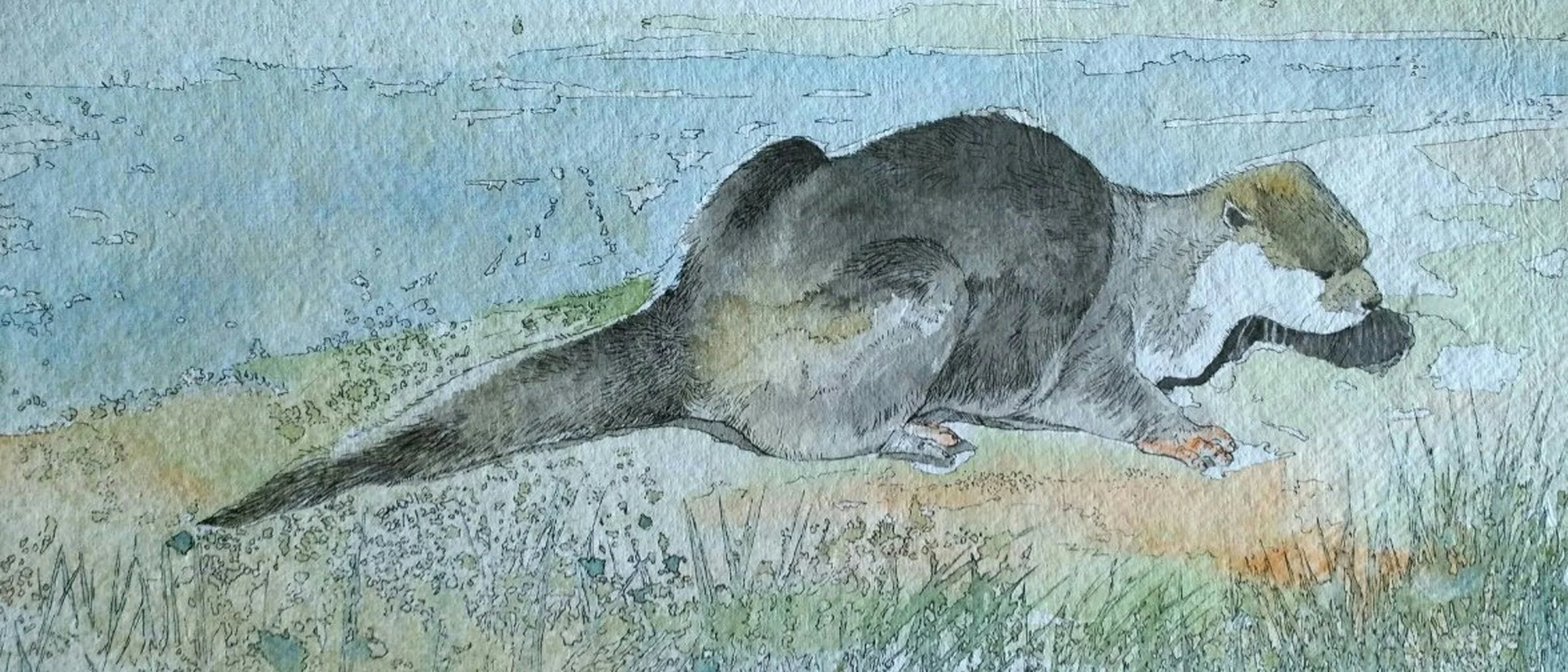otters in the spotlight
"Have you ever seen otters in the wild? What a miraculous sight! Watching them play, groom, swim, forage, poop-dance or do any other activity is an experience to treasure for life. We hold on to these special moments and go out seaking for more, through direct observations in otter habitats, or recordings via camera traps. Unfortunately, nowadays otter behaviors have become widely available to watch online in a very different scenery than in the wild where they belong - and we’re here to try and change that.”- Shiri Lev, The Otter CollectiveBanner artwork (above) by Dr. V. Gokula
Why Are OTTERS Important?
A few common characteristics among the thirteen extant otter species: they are semi-aquatic carnivores, have playful characters, and have the best fur of all mammals.
Artwork by Lene Holmen
Depending on the species, geographical and environmental factors, such as food resources, otters can live both in groups or individually. Some species, such as the elusive hairy-nosed otter, or the Congo-clawless otter, have not been studied as much as other species of otter, such as sea otters or giant otters.
Otter habitats include water bodies such as rivers, lakes, and estuaries. Some species, the smooth-coated otters in Singapore for example, are highly adaptable to the changing urban scenery. The river otter is also known for its resilience and adaptability, yet all otter species are susceptible to one of the main threats to otter survival - anthropogenic interference.
When it comes to their diet, otters can be opportunistic and generalist like the African-clawless otter. Other species can maintain a healthy ecosystem thanks to their feeding habits. Each otter species is significant to its ecosystem in more than one way, all otter species are apex predators and bioindicators of healthy water environments.
Some species of otter serve as keystone species, such as the sea otter. The sea otter trade was mainly for their pelts and lasted for over two centuries. The sea otter was on the brink of extinction, which caused a cascade effect on the entire ecosystem and affected their DNA. Only now do we know of their essential contribution to managing the current climate crisis, which is threatening their health and survival.
what are the challenges facing OTTERS?
Out of thirteen otter species worldwide, five are endangered, five are near threatened, two are vulnerable and only one is considered to be of least concern on the IUCN Red List of Threatened Species. Here are a few reasons why:
Artwork by Sofiya Shukhova
Anthropogenic interference is a serious threat to biodiversity; human disturbance, pollution, and habitat destruction affect otter survival. Recent studies show evidence of microplastic components in Marine otter and Eurasian otter scats.
Human-otter conflict is common among fishermen's communities. Evidence of otters being a “perceived threat” was documented in studies conducted in various locations, including the giant otter in Brazil, Neotropical otter in Mexico, and Eurasian otter in Portugal among others. This often results in killing or trapping otters, which can result in trade.
Otters both as fur and as live animals have been desired by humankind for various reasons, for centuries, resulting in extensive trade. When the sea otter fur trade started it was meant for clothing, but as hunting continued, otters became of interest to the ruling class of Beijing, and their fur became an item for the rich. It was then also utilized as a decorative object, for religious garments, and considered a luxurious status symbol.
In some cultures, it is believed that the body parts of otters have medicinal qualities. The leftover meat can also be consumed for food. The trade and use of otters continue in some parts of the world to this day, although legislation and enforcement efforts are present.
A recent trend in the illegal otter trade is pets and otter cafes, which include two main Asian species - the smooth-coated otter and the small-clawed otter. Hunting otter pups involves killing the adult members of an otter family group, which can also be traded for fur and body parts. The pups are captured, smuggled, and trafficked through SouthEast Asia and Japan.
As social media became popular and untraceable, stakeholders utilize online posts for trade. This is one of the most concerning threats for otter species worldwide since people are inclined to hunt/buy otters and keep them as pets, simply because cute pet otter videos portray a false notion that wild otters can make good pets.
what can WE do to help?
STUDY OTTERs
Otters are found on all continents except Australia and Antarctica; check what local species of otter are found near you.
Many initiatives, NGOs, and environmental organizations are involved in otter conservation. Join local initiatives that study otter species in your area. You can contribute to research efforts by joining citizen science projects where you live or where you’re traveling to. Conservation efforts include each and every one of us. Help monitor otters in your environment, reach out to local organizations, and see how you can help!
celebrate OTTERs
Artwork by Sharon Barcs
Most popular among various cultures worldwide, otters are part of folklore, myths, and stories, being a symbol of maternity and playfulness. There are plenty of books and movies about otters. Some book recommendations are “Tarka the Otter” by Henry Williamson, “Otter” by Daniel Allen, and “Ring of Bright Water’” by Gavin Maxwell. Note that these stories pre-date our understanding that this species should NEVER be kept as pets.
Creating otter art is a wonderful way to celebrate otters. Capturing their shape might be challenging yet if you want to try, your creation can help raise awareness about the illegal otter pet trade.
PROTECT OTTERs
Online: Remember to avoid liking or sharing illegal pet otter posts on social media. Make sure before you like or share otter content: observe the situation in videos or photos you encounter, are the otters in their natural surroundings or in verified rehab facilities? Report posts, or even get a screenshot and send it to us via ottercollective@wildotters.com.
Donate online to organizations that help study and/or save otters, there are many who are working for otter conservation worldwide.
Offline: Protect otter habitats and avoid littering in nature surroundings. Organize a cleanup at your local beach, lake, or riverbank, or donate to organizations dedicated to this cause. Avoid buying products from companies that pollute the environment. Try to reduce your plastic consumption, remember waste ends up in our oceans.
If you spot otters in the wild, duck down and be as quiet as possible - enjoy your observation and share the excitement without giving away the exact location. Adore otters from afar.

